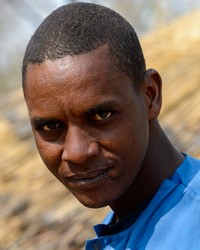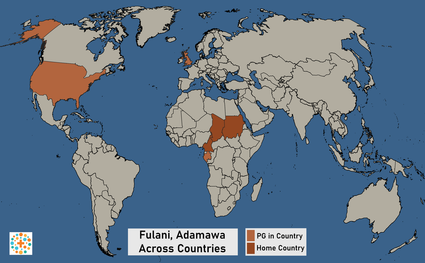The Fulani have lighter skin, thinner lips, and straighter hair than other African groups living near them. Centuries ago, the Fulani tribes migrated from northern Africa and the Middle East into Central and West Africa. Eventually some found their way further east to Sudan. Most of them are still nomadic shepherds who travel with their flocks in search of better grazing land.
The Fulani tribes are grouped and named according to their locations, occupations, and dialects. They are located in an almost horizontal strip across Africa from Senegal in the west to Sudan in the east. The Sahara Desert forms their northernmost boundary, while the threat of tsetse flies control their movement to the south.
The Fulata are a subgroup of the Fulani who live in Sudan.
Fulata herders trade with neighboring tribes for millet, yams, and peanuts. Milk from their livestock is the main staple in their diet, and this distinguishes them from the tribes who do not milk their cattle. They also produce butter, which can be traded in the markets.
The Fulani nomads live in "wet season camps" while planting and harvesting. The pastures are lush and green, and the cattle graze freely. These camps consist of beehive-like huts made of woven twigs, leaves, and grass. During the dry seasons they camp in portable huts, moving the cattle or sheep to well-watered lands in the flood plains.
While the older men exercise the leadership of the tribes, it is the duty of the younger men to move the herds. Boys are responsible for helping their older brothers with the herds. Women usually milk the cattle and sell butter in the markets. Fulani women in Sudan wear brightly colored clothes and makeup even when working with livestock.
The Fulata are a proud people who teach their children the value of dignity. The Fulata are expected to follow a code of high moral behavior known as Pulaaku. Pulaaku extols virtues such as kindness, bravery, patience, tolerance, perseverance, honesty, diligence, generosity, and dignity. To be reserved is part of being dignified; thus, they are shy and modest in public. A mother does not show affection to her infant son. In fact, she never even calls her firstborn by his name all throughout his life.
In terms of spiritual beliefs, the Fulani are almost entirely Sunni Muslim with many animistic beliefs blended in.
The Fulani in Sudan need reliable sources of water for their livestock and for their families.
Pray for abundant rain as a testimony of God's power and love for the Fulata people.
There are gospel recordings available in their languages. Pray that Fulata people will have easy access to them, as well as Christian radio broadcasts.
Pray that there will soon come a day when there will be skits and plays that teach the Fulata about the life of Christ and about Christ-like living.
Pray for the Fulata to come in contact with Holy Spirit-led believers in Sudan and South Sudan.
Pray for the Holy Spirit to do a new work among Fulata leaders that will open doors for a movement to Christ.
Pray for faithful teams to regularly pray for the Fulani peoples.
Scripture Prayers for the Fulata in Sudan.
https://www.youtube.com/watch?v=UHrqL4Bi-YU
https://www.youtube.com/watch?v=JxVs79WBv_Q
https://www.youtube.com/watch?v=8ITCqct8Xzg
http://www.sudantribune.co
| Profile Source: Joshua Project |

























